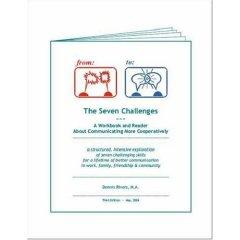| 2020ok Directory of FREE Online Books and FREE eBooks |
Free eBooks > Reference > Words & Language > Communication > The Seven Challenges: A Workbook And Reader About Communicating More Cooperatively
The Seven Challenges: A Workbook And Reader About Communicating More Cooperativelyby Dennis Rivers  Download Book (Respecting the intellectual property of others is utmost important to us, we make every effort to make sure we only link to legitimate sites, such as those sites owned by authors and publishers. If you have any questions about these links, please contact us.) link 1 link 2 About Book Book Description The Seven Challenges Workbook guides readers in learning how to communicate more copperatively, more compassionately, more creatively, and more successfully. The Seven Challenges Workbook is also available in a coil bound edition.
Excerpted from The Seven Challenges : A Workbook and Reader About Communicating More Cooperatively by Dennis Rivers. Copyright © 2001. Reprinted by permission. All rights reserved. Creating the life that lives between us. Seven lifetime challenges in the process of communicating more cooperatively as described in The Seven Challenges Workbook. CHALLENGE ONE. Listen more carefully and more responsively - acknowledging the feelings and wants that people express in word and mood. Acknowledgment does not have to mean agreement. Compassionately allow people to feel whatever they feel. This sets the example for others to hear and acknowledge your feelings, also. CHALLENGE TWO. Explain your conversational intent and invite consent. Use one of 30 basic conversational openers such as "Right now I would like to take a few minutes and ask you about...[subject]." The more important a conversation is to you, the more important it is for all participants to know and agree on the overall goal. CHALLENGE THREE. Express yourself more clearly and completely - giving your listeners the information they need to understand (mentally reconstruct) your experiences. One good way is to use "the five I-messages": What/how I (1) observe, (2) feel, (3) interpret/evaluate, (4) want to request, and (5) hope for from request. CHALLENGE FOUR. Translate criticism and complaints into requests and explain the positive results of having your request granted. Do this for both your own complaints and the complaints that other bring to you. Focusing on the positive outcome allows the recipient of a request to save face (important in every relationship). CHALLENGE FIVE. Ask question more "open-endedly" and more creatively. "How did you like that movie?" is an open-ended question that invites a wide range of answers. "Did you like it?" suggests only "yes" or "no" as answers and does not encourage discussion (How do you feel about this suggestion?) CHALLENGE SIX. Thanking...Explore and express more appreciation, gratitude, encouragement and delight. In a world full of problems, look for opportunities to give praise. Both at home and at work, it is the bond of appreciation that makes relationships strong enough to allow for the stresses of problem-solving. CHALLENGE SEVEN. Make the effort...Make the practices described in challenges 1 thu 6 important parts of your everyday life. Pay attention to each conversation as an opportunity to grow in skill, awareness and compassion. Work to redefine each of your "opponents" in life as a learning and problem-solving partner. Related Free eBooks | Related Tags |












SEND A COMMENT
PLEASE READ: All comments must be approved before appearing in the thread; time and space constraints prevent all comments from appearing. We will only approve comments that are directly related to the article, use appropriate language and are not attacking the comments of others.